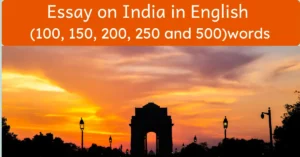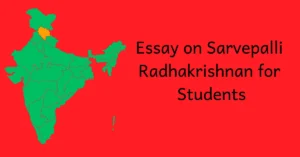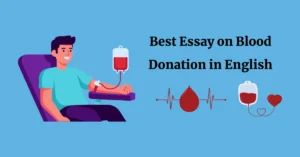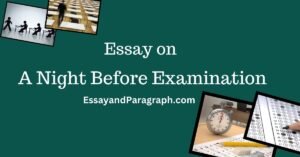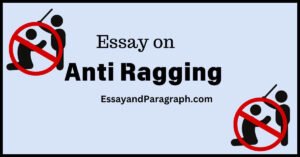Ever wondered why going to school is not just a choice but a right? The right to education is something every child deserves, no matter where they live or how much money their family has. It is a promise that every boy and girl can learn, grow, and dream of a better future. From the small classrooms in villages to the big schools in cities, education opens doors to opportunities. In this article, we will learn how to write an essay about the right to education in simple words so every student can understand and feel inspired.
10 Lines Essay on Right to Education for Students
The right to education means every child can go to school.
It is given by the law in many countries.
Education helps us learn new things.
It makes us smart and confident.
Every child has the same right to study.
Education helps us get good jobs in the future.
It teaches us to be good citizens.
Schools give us friends and teachers to guide us.
No one should be stopped from learning.
The right to education makes the world a better place.
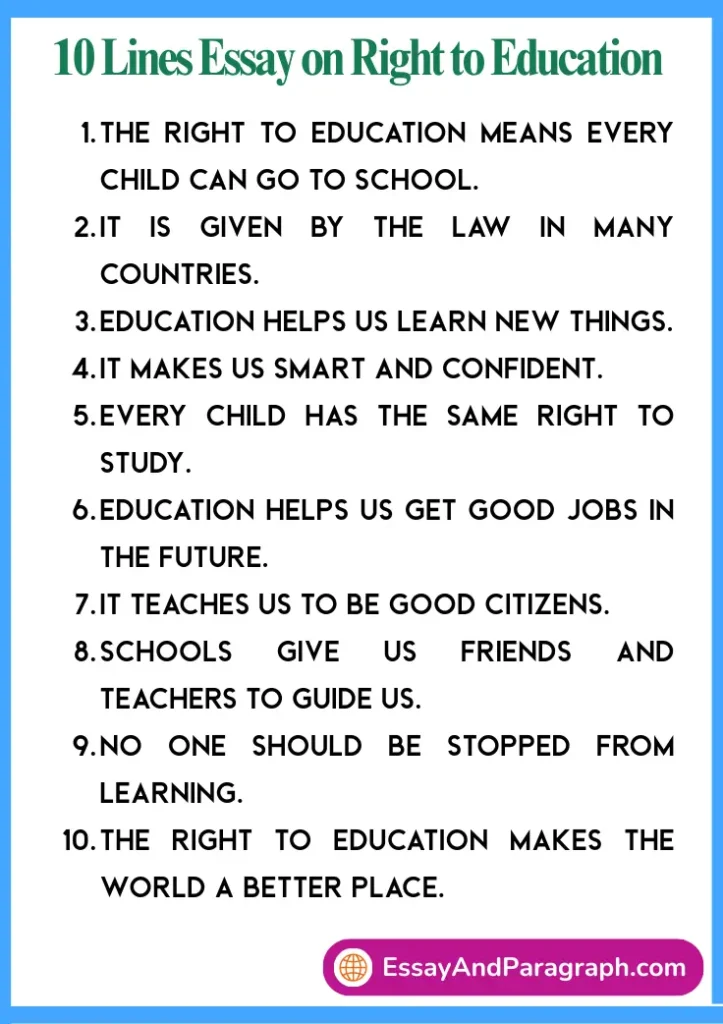
Essay on Right to Education – 100 Words
The right to education is a basic human right. It means every child should be able to go to school and learn. Education helps us read, write, and understand the world better. In Bangladesh, the government provides free primary education to all children. This is important because learning makes us confident and prepares us for the future. Without education, it is hard to find good jobs or help our community. Every boy and girl, rich or poor, must get the chance to study. The right to education helps make our world fair and full of opportunities for everyone.
Essay on Right to Education – 150 Words
The right to education means that every child can go to school and learn, no matter who they are or where they live. It is a basic human right given by laws in many countries. Education teaches us how to read, write, and think. It helps us become smart, confident, and ready for the future.
In Bangladesh, the government gives free primary education to all children. This is important because poor families can still send their children to school. According to UNESCO, education can help reduce poverty and improve lives. When boys and girls both get the chance to study, our country becomes stronger.
The right to education is not just about learning in books—it is about learning how to live, respect others, and make good choices. Every child should enjoy this right so the world can be a better and fairer place for all.
Essay on Right to Education – 200 Words
The right to education is one of the most important rights for every child. It ensures that no matter where you are born or how much money your parents have, you can still go to school and learn. Education is the key to success. It teaches us how to read, write, solve problems, and understand the world. It also helps us make friends, learn good manners, and become better people.
In many countries, including Bangladesh, the law says all children must go to school. Primary education is free so that no child is left behind. According to UNESCO, more than 258 million children worldwide are still not in school, which is a big problem. Without education, children cannot get good jobs when they grow up. They may also face difficulties understanding their rights and responsibilities as citizens.
When every child gets an education, the country becomes stronger. Educated people can work in better jobs, start businesses, and help their communities. The right to education is not just about learning in a classroom—it is about giving every child a fair chance in life. If we all support this right, we can build a brighter future for everyone.
Short Essay on Right to Education – 250 Words
The right to education is a powerful tool that can change lives. It gives every child the chance to learn, grow, and achieve their dreams. Education is more than just reading books—it is about understanding the world, solving problems, and making good decisions. Every child, whether living in a city or a small village, should have the same chance to go to school.
In Bangladesh, free primary education is given to all children between the ages of 6 and 10. This is important because it means that poor families do not have to pay for their children’s first years of school. According to the Bangladesh Bureau of Statistics, the literacy rate in 2023 was about 76.8%, which shows that more children are learning than before.
The right to education also includes equality. Boys and girls should have the same opportunities. No child should be stopped from learning because of their gender, disability, or family’s income. When children are educated, they can help their families, earn better incomes, and contribute to society.
In the future, if we make sure all children go to school, our world will be more peaceful and fair. Education is like a light that brightens the path to success, and the right to education makes sure everyone can walk that path.
Long Essay on Right to Education – 500 Words
The right to education is one of the most important human rights in the world. It means that every child, no matter where they are from, has the right to go to school and learn. Education is the foundation of personal and national growth. It gives us knowledge, skills, and the power to change our lives.
In Bangladesh, the Constitution ensures free primary education for all children. This is a big step toward making sure that no child is left behind. Schools are places where we learn to read, write, and solve problems. But education is more than just school subjects—it teaches us how to live with respect, honesty, and kindness.
According to UNESCO, education helps reduce poverty, improve health, and promote equality. When people are educated, they can get better jobs, earn more money, and take care of their families. Education also helps communities grow stronger because people understand their rights and can make better decisions.
Sadly, millions of children around the world still do not go to school. Some cannot afford it, others live far from schools, and some face discrimination. This is why governments and organizations work hard to make education free and fair for all.
The right to education also means equal opportunities for boys and girls. In some areas, girls are still not sent to school because of cultural beliefs. But research shows that educating girls can help improve a country’s economy and health.
If we all work together—governments, teachers, parents, and communities—we can make sure that every child enjoys this right. Education is like a seed. When it is planted in the mind, it grows into a tree of knowledge that gives fruits for life. The right to education makes sure that every child gets the chance to plant that seed.
FAQs on Essay on Right to Education for Students
1. What does the right to education mean?
The right to education means that every person, especially children, has the right to go to school and learn. This right is given by laws in many countries and supported by organizations like the United Nations. It ensures that no child is left out because of poverty, gender, or background. Education helps people gain knowledge, improve their lives, and contribute to society. Without this right, many children would miss opportunities to grow and succeed in the future.
2. Why is the right to education important?
The right to education is important because it opens doors to opportunities. It helps people learn skills that are needed for good jobs and a better life. Education also teaches values like respect, honesty, and cooperation. When people are educated, they can help improve their communities and their country. According to UNESCO, every extra year of schooling can increase a person’s income by up to 10%. This shows how powerful education can be in changing lives.
3. How is the right to education protected in Bangladesh?
In Bangladesh, the Constitution ensures free and compulsory primary education for all children. The government runs programs to give free textbooks and meals in some schools. These steps encourage more children to attend classes regularly. According to the Bangladesh Bureau of Statistics, school enrollment has increased greatly in recent years. This shows that efforts to protect the right to education are working, but more needs to be done to reach remote areas.
4. What are the challenges to achieving the right to education?
There are several challenges to achieving the right to education. These include poverty, lack of schools in rural areas, cultural beliefs that stop girls from studying, and poor quality of teaching. Natural disasters can also damage schools and stop children from learning. To solve these problems, governments and communities need to work together to build more schools, train teachers, and support families so that all children can go to school.
5. What can we do to support the right to education?
We can support the right to education by encouraging every child to go to school. Parents should send their children to classes regularly. Communities can organize programs to raise awareness about the importance of learning. Governments should make sure that schools have enough teachers, books, and safe buildings. Donating to education-focused charities is another way to help. When everyone works together, we can make education possible for every child.
Top 5 Quotes on Right to Education
“Education is the most powerful weapon which you can use to change the world.” – Nelson Mandela
“The right to education is the right to dream and achieve.” – Unknown
“Learning is a treasure that will follow its owner everywhere.” – Chinese Proverb
“A child without education is like a bird without wings.” – Tibetan Proverb
“Education is not preparation for life; education is life itself.” – John Dewey
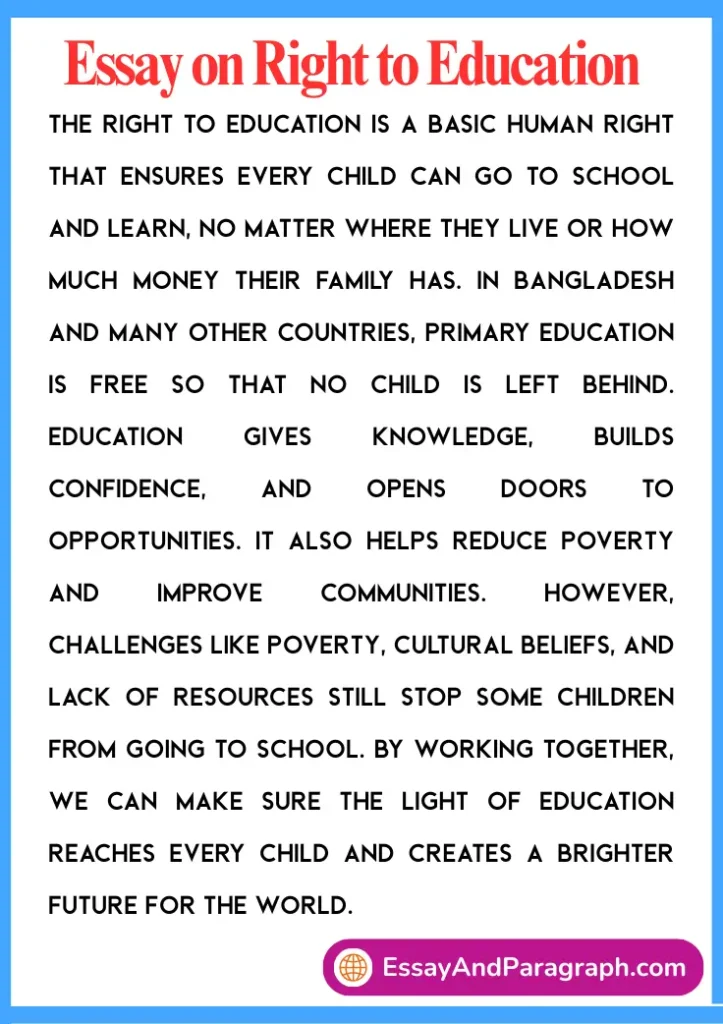
Summary on Essay on Right to Education for Students
The right to education is a basic human right that ensures every child can go to school and learn, no matter where they live or how much money their family has. In Bangladesh and many other countries, primary education is free so that no child is left behind. Education gives knowledge, builds confidence, and opens doors to opportunities. It also helps reduce poverty and improve communities. However, challenges like poverty, cultural beliefs, and lack of resources still stop some children from going to school. By working together, we can make sure the light of education reaches every child and creates a brighter future for the world.


